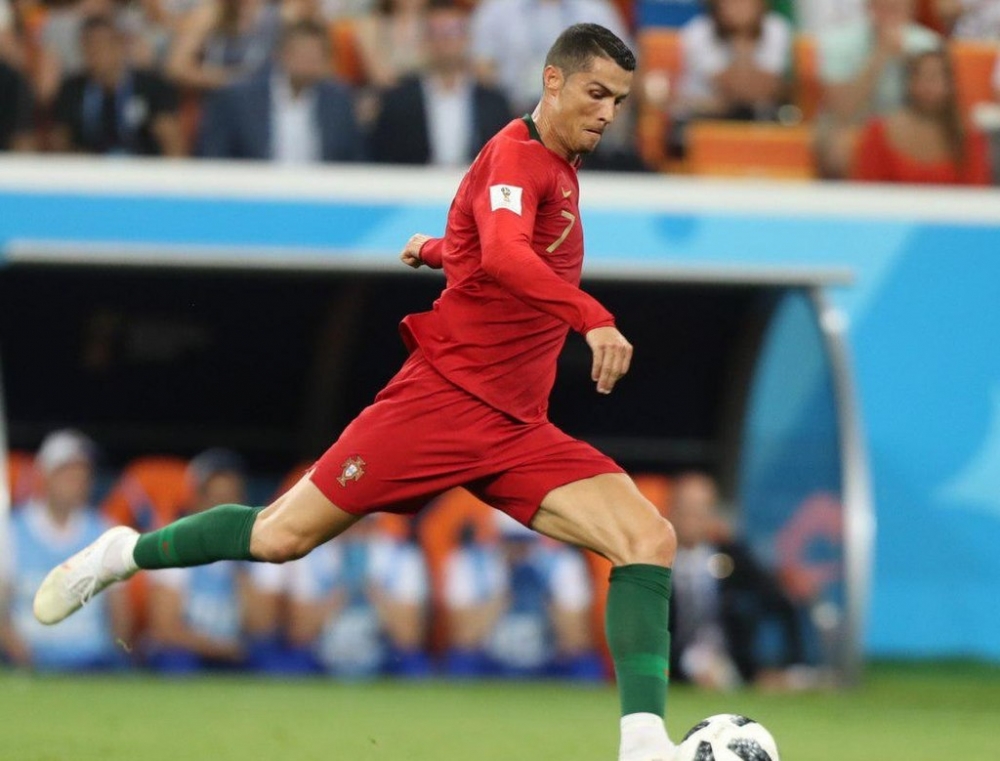Scientists evaluate the effects of football players’ preparation and recovery on their kicking performance
Article published by Brazilian researchers in Sports medicine presents a systematic review of scientific studies on the subject.
Article published by Brazilian researchers in Sports medicine presents a systematic review of scientific studies on the subject.

Article published by Brazilian researchers in Sports medicine presents a systematic review of scientific studies on the subject (image: Cristiano Ronaldo/Mahdi Zare, Fars press agency)
By Luciana Constantino | FAPESP Agency – Brazilian researchers have published a systematic review of scientific literature showing that certain warm-up strategies such as dynamic stretching can effectively prepare soccer players to maintain kicking accuracy, while intense physical exercises have a negative effect on ball speed when kicking, and consumption of carbohydrate drinks during a match may allow players to maintain adequate kicking performance in the final moments of prolonged physical exercise, such as during sudden-death playoffs.
The article, published in the magazine Sports medicine As of December 2020, 52 studies were analyzed, of which ten examined the acute effects of warm-up exercises while 34 verified the overall impact of exercise training and 21 explored strategies related to recovery.
Kicking skills are essential in football, especially for scoring goals. The top three clubs on matchday 30 of the 2020 Brazilian Championship, for example, have taken 162, 132 and 169 shots on goal respectively in the matches played so far, scoring 50, 48 and 51 goals.
Individual player characteristics such as maturity, skill level and gender can influence performance, but training and recovery interventions also help achieve better results.
The literature review was part of the doctoral research carried out by Luiz Henrique Palucci Vieira with support from FAPESP at the Human Movement Research Laboratory (MOVI-LAB) of the School of Sciences of the State University of São Paulo (FC-UNESP) in Bauru.
Vieira’s thesis supervisors are Fabio Augusto Barbieriwho runs MOVI-LAB, and Paulo Santiago, who also participated in the review. Vieira carries out his research at the Ribeirão Preto School of Physical Education and Sports of the University of São Paulo (EEFERP-USP) with the support of FAPESP through projects 2019/22262-3 And 2019/17729-0.
According to Vieira and his co-authors of the review, kicking speed is negatively affected by intense exercise protocols, such as intermittent endurance sprinting or gradual efforts to exhaustion, while passive half-time rest does not affect kicking speed. Kicking accuracy and ball speed can be improved by warm-up routines including dynamic stretching, while consuming carbohydrate drinks can help maintain ball speed after prolonged exercise.
The authors conclude that the review can help inform future research and practical interventions aimed at measuring and optimizing soccer kicking performance, although additional studies are needed, particularly involving younger players.
The next steps in Vieira’s project will include experiments designed to evaluate the effects of preparation and recovery techniques on kicking players’ performance. First, the researchers analyzed the impact of individual characteristics such as sleep quality and brain activity (notably cortical) during the execution of mid-distance kicks.
“This is innovative research from the point of view of applicability, targeting different types of information, methods and knowledge in neuromechanics to try to improve the performance of soccer players,” Barbieri said. FAPESP Agency. “One example is monitoring brain activity during the preparation and execution of kicks. Few studies have done this anywhere in the world.
The second part of the project will include post-activation potentiation (PAP) and cold water immersion testing, both widely used by football coaches, to discover how they affect movement mechanics and performance in young players.
Kicks by under-17s at a club in the interior of São Paulo state were filmed using slow-motion cameras in 2019 and 2020 to analyze leg movements, kick speed, ball and kicking accuracy. “This year we will continue our research to look for factors that influence kicking, complete our analysis of the collected data and publish a paper,” Vieira said.
Academics have little access to professional soccer clubs in Brazil for research and scientific partnerships, he noted. More openness and collaboration are needed to advance science and improve player performance, as scientific journals in this area tend to only publish articles with practical applications.
Methodology
To arrive at the study universe used in the review, the researchers conducted a systematic search for certain keywords and descriptors in articles indexed up to July 2020 by PubMed, Web of Science, SPORTDiscus, Scopus and ProQuest. The search resulted in 10,780 studies. After removing duplicates and studies that did not directly address sports performance, there remained 52 studies considered suitable for systematic review. A total of 947 players were evaluated in these studies, all men. According to Vieira, very little scientific research is done on female athletes. “It is also one of the priorities that we defend,” he said.
The article “Acute effects of warm-up, exercise and cool-down strategies on the assessment of soccer kicking performance: a critical and systematic review” can be extracted from: lien.springer.com/article/10.1007/s40279-020-01391-9.
